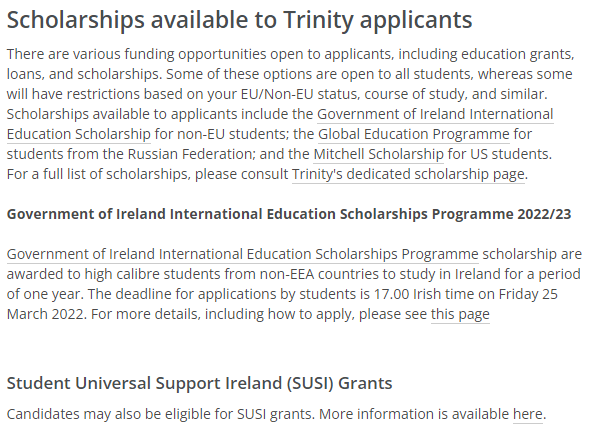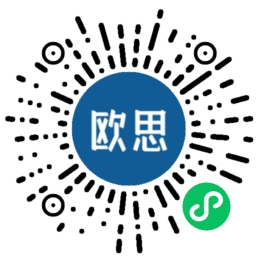爱尔兰圣三一大学数字人文与文化(哲学硕士)申请攻略
当今世界的许多重大问题只能通过利用文化和技术知识来回答。三一学院的哲学硕士。数字人文与文化硕士课程帮助学生做好在各种背景下回答这些问题的准备,无论他们是否想通过数据挖掘和可视化加深对人文学科的理解;探索博物馆、图书馆和档案馆内外文化和遗产的虚拟传播;或者加入让技术开发更加人性化的运动。 在数字人文领域,受过历史、文学、语言、艺术、计算机科学和工程学训练的研究人员结合他们的技能来改变我们对世界的理解。他们还开发了技术能力,以提高我们观察人类行为模式以及人类如何描述其经历的能力。我们的课程与其他数字人文课程的不同之处在于,我们同样重视技术对人文研究的作用,以及人文研究对促进以人为本的技术设计的兴起的作用。我们还利用跨学科以及与图书馆和技术支持同事建立的合作来提供独特的教育体验。挑战的流动。
Course Details
The Masters (MPhil) in Digital Humanities and Culture is a 90-credit, Masters-level programme taken full-time over one year. Students who do not complete a dissertation are awarded a Postgraduate Diploma (PGradDip) if they pass all the taught components of the programme.
The programme consists of:
4 term-long compulsory core modules (2 x 10 credits), one per term;
2 term-long optional modules (4 x 10 credits), two per term;
1 research dissertation (30 credits)
Students take the two core modules (Theory and Practice of Digital Humanities and Building Digital Humanities Projects) in Michaelmas Term (September-December) and two core module (Cultural-Technical Systems and Digital Humanities Internships and Project Management)) in Hilary Term (January-April). One optional module is taken in Michaelmas Term and one in Hilary Term.
A dissertation of 15,000-20,000 words is completed in Trinity Term (May-August) and must be submitted by the end of August. In addition, students are expected to participate in the research skills module of the School of Languages, Literatures and Cultural Studies. This series of workshops is non-credit-bearing activities, but will be recorded as a part of the dissertation module.
Core Modules
The MPhil in Digital Humanities and Culture has four required, core modules
1. Theory and Practice of Digital Humanities
This module will survey the field of digital humanities – how computational methods are being used to further humanities research and teaching. It will explore how advanced and experimental computational techniques are being used to challenge and change the very nature of humanities research as well as its system of academic rewards. The course is framed by the idea of the technology ‘stack,’ and the manner in which the hardware, software and data layers within digital humanities research open up possibilities for analysis and presentation of results, but also introduces potential compromises. Areas to be covered include: key debates in the field; data and the datification of cultural artefacts; thematic research collections; natural language processing and topic modelling; big data; humanities visualisation; and user-centred design.
On successful completion of this module students should be able to:
Identify and critique digital humanities as set of research practices;
Engage with the tools and technologies used in digital humanities scholarship;
Recognise and articulate the differences between disciplinary practices;
Differentiate current trends and theoretical perspectives in the field;
Express the implications of different technology layers for the investigation of humanities research questions and presentation of results;
Explain how digital humanities impacts on more traditional disciplinary practice.
2. Cultural-Technical Systems
This module will engage students in a critical assessment of the technologies, platforms and companies commonly used in digital humanities as well as in 21st century culture and society, providing them with both case studies and a theoretical framework to use and speak about technology development and its relationship to core human activities. It will present a set of cases for discussion and exploration from theoretical and forensic perspectives. These cases will be organised into three sections. In the first, the focus will be on the process of modelling, what we mean by this, how models are constructed and the advantages and disadvantages that the bring (in particular in big data contexts). The second section of the module will focus on memory identity practices, including storytelling, and how interactions mediated by information and communication technologies can disrupt these significant processes. The third section will look at the issues of autonomy, agency and authority, specifically in the context of the rise of artificial intelligence.
On successful completion of this module students should be able to:
Recognise core texts, contexts and concepts for the discussion of science and technology studies
Explore case studies in which technology has either greatly supported or harmed social, cultural or individual development.
Explain the complex interactions in such cases with technological affordances, social/cultural/psychological factors and political or business imperatives 3. Building Digital Humanities Projects
This module will introduce students to the common technologies that underlie digital humanities and to give them the structured opportunity to apply one or more of these with content of their choosing. The first part of the module will be focussed of enabling students to understand how and acquire basic competence with some of the specific technologies and standards most commonly used in the digital humanities, including web technologies (XML, HTML, CSS etc.); digital editing with TEI and Oxygen; tools for data mining and visualisation (Python, Gephi etc.). These introductory sessions will take place in coordination with the existing 5 ECTS module ‘Digital Scholarship and Skills’ (HH7025). The second part of the course will require them to define a digital project using one or more of these technologies and build an edition, visualisation, corpus or exhibition.
On successful completion of the module students should be able to:
Describe the methods by why data is prepared and manipulated across a number of common digital humanities applications
Identify, Assemble and Prepare a data set to make it ready for use in a digital humanities context
Apply common technologies for the manipulation of text and images in the digital humanities context
Create a functional digital humanities project output
4. Digital Humanities Internships and Project Management
The aim of this module is to introduce students to practical work experience on digital projects in cultural heritage organizations, libraries, companies and on TCD-based digital humanities projects. Student will learn the basics of project management and good project planning through the taught elements of the module which will give them the project management skills to carry out their internship projects. Students will be set specific tasks appropriate to the organisations in which they are working agreed upon by the module coordinator and the staff liaison at the Institution during the previous semester.
On successful completion of this module students should be able to:
Describe from experience a practical context in which digital humanities knowledge was applied, and how these skills enhanced the culture and aims of the project or organisation.
Analyse a digital humanities project or subproject, formulate a project strategy, and carry it out;
Work as part of a team;
Identify the issues and challenges facing digital projects;
Apply the methodologies, theories, and practice learned in the classroom to a work place project;
Recognise the intellectual, technical, and financial issues facing digital projects
学制:1年
学费:19020欧元/年
奖学金:

Applicants must evidence their motivation and preparation to join the course through their academic writing sample (no more than 2,500 words) and completed personal statement (which must be submitted on the course template, found here.)
PS模板链接: https://view.officeapps.live.com/op/view.aspx?src=https%3A%2F%2Fwww.tcd.ie%2Flangs-lits-cultures%2Fpostgraduate%2Fdigital-humanities%2Fassets%2Fdocs%2FMPhil_DHC_Personal_Statement_Form_2022.docx&wdOrigin=BROWSELINK
A) Personal Statement Form: The Personal Statement Form is an important part of our assessment process. It is your opportunity to state your reasons for applying to this programme and how they match what the programme delivers. Applicants who would like to make the Course Director aware of further information relevant to their application may also upload an optional personal cover letter to their dossier.
B) Sample of Academic Writing: As part of your application, you also need to submit a sample of no more than 2,500 words (excluding bibliography) of your best academic writing in English. When we assess your application, we will pay particular attention to your ability to: Build and present a logical, cohesive argument. Analyse and evaluate the arguments of others. Adhere to the norms of academic writing (referencing, quotation, avoiding plagiarism* and other forms of academic misconduct, and bibliography). Use academic English.
C) Two Reference Letters: You will need to provide reference letters from two people not related to you who can provide references written in English, explaining why you would be a strong candidate for the course. It is the responsibility of the applicant to contact their referees and to upload their reference letters on their behalf to Trinity’s online application system. Please note that Trinity's online application system does not prompt referees for their reference letters; the applicant must therefore obtain the letters first and then upload them to the system.
D) Current Professional CV: Although this is not a formal requirement for entry into the programme, we may use your CV in the course of organising an internship experience for you.
Applicants may also be asked to take part in a short interview (in person or via phone / Skype) as part of the assessment process.
A) English Language Qualifications: Unless you have completed a degree through the medium of English or are a native speaker, you are required to prove your proficiency with the language. Trinity prefers IELTS, but will accept alternative tests run by international organisations, such as TOEFL. A minimum of 6.5 in each category or its equivalent is required.
B) Degree Certificate(s): You will need to provide degree certificates (in PDF format) that prove you have completed all of the degrees you mention in your application. If you haven’t yet completed your degree, you can still apply and supply these documents when you have them.
C) Degree Transcripts: You will need to provide official transcripts (in PDF format) showing all of the components you have completed as part of your degree(s).
Applicants must evidence their motivation and preparation to join the course through their academic writing sample (no more than 2,500 words) and completed personal statement (which must be submitted on the course template, found here.)
PS模板链接: https://view.officeapps.live.com/op/view.aspx?src=https%3A%2F%2Fwww.tcd.ie%2Flangs-lits-cultures%2Fpostgraduate%2Fdigital-humanities%2Fassets%2Fdocs%2FMPhil_DHC_Personal_Statement_Form_2022.docx&wdOrigin=BROWSELINK
A) Personal Statement Form: The Personal Statement Form is an important part of our assessment process. It is your opportunity to state your reasons for applying to this programme and how they match what the programme delivers. Applicants who would like to make the Course Director aware of further information relevant to their application may also upload an optional personal cover letter to their dossier.
B) Sample of Academic Writing: As part of your application, you also need to submit a sample of no more than 2,500 words (excluding bibliography) of your best academic writing in English. When we assess your application, we will pay particular attention to your ability to: Build and present a logical, cohesive argument. Analyse and evaluate the arguments of others. Adhere to the norms of academic writing (referencing, quotation, avoiding plagiarism* and other forms of academic misconduct, and bibliography). Use academic English.
C) Two Reference Letters: You will need to provide reference letters from two people not related to you who can provide references written in English, explaining why you would be a strong candidate for the course. It is the responsibility of the applicant to contact their referees and to upload their reference letters on their behalf to Trinity’s online application system. Please note that Trinity's online application system does not prompt referees for their reference letters; the applicant must therefore obtain the letters first and then upload them to the system.
D) Current Professional CV: Although this is not a formal requirement for entry into the programme, we may use your CV in the course of organising an internship experience for you.
秋季入学DDL:6 月 28 日
Career Opportunities
This course prepares graduates for careers in project management, cultural outreach, NGO activities, exhibition creation, media and communications, data management, research, and humane technology management.

